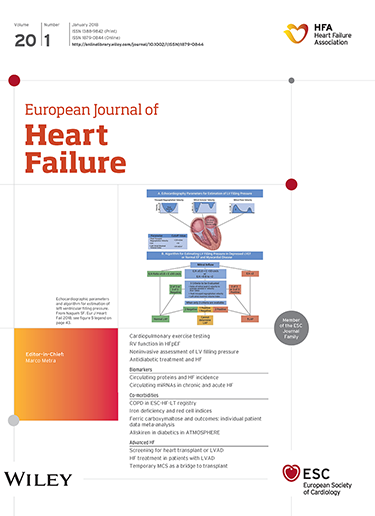Kidney injury in patients with heart failure‐related cardiogenic shock: Results from an international, multicentre cohort study
IF 16.9
1区 医学
Q1 CARDIAC & CARDIOVASCULAR SYSTEMS
引用次数: 0
Abstract
AimsHeart failure–related cardiogenic shock (HF‐CS) accounts for about half of CS cases, with a paucity of data regarding the role of kidney injury in this subset. This study aims to evaluate patient characteristics and outcome associated with renal function in patients with HF‐CS.Methods and resultsIn this multicentre, international, retrospective study, patients with HF‐CS from 16 tertiary care centres in five countries were enrolled between 2010 and 2021. To investigate differences in clinical presentation, complications, and 30‐day mortality, based on renal function, adjusted logistic and Cox regression models were fitted. Among 1010 HF‐CS patients, the median age was 64 (interquartile range [IQR] 52–75) years, with 71.7% being male. Median baseline creatinine was 1.7 (IQR 1.2–2.5) mg/dl, corresponding to an estimated glomerular filtration rate (eGFR) of 41.0 (IQR 25.2–62.2) ml/min/1.73 m心衰相关心源性休克患者肾损伤:一项国际多中心队列研究结果
心力衰竭相关的心源性休克(HF - CS)约占CS病例的一半,关于肾损伤在这一亚群中的作用的数据缺乏。本研究旨在评估HF - CS患者肾功能相关的患者特征和预后。方法和结果在这项多中心、国际、回顾性研究中,2010年至2021年间纳入了来自5个国家16个三级医疗中心的HF - CS患者。为了研究临床表现、并发症和基于肾功能的30天死亡率的差异,拟合了调整后的logistic和Cox回归模型。1010例HF - CS患者中位年龄为64岁(四分位数范围[IQR] 52-75),其中71.7%为男性。中位基线肌酐为1.7 (IQR 1.2-2.5) mg/dl,对应于肾小球滤过率(eGFR)估计为41.0 (IQR 25.2-62.2) ml/min/1.73 m2。在急性肾损伤(AKI)患者中,30天死亡率随AKI分期而增加(无AKI 41.7%, AKI 1期43.3%,AKI 2期50.0%,AKI 3期63.7%;AKI 3期的校正风险比[HR]为1.97,95%可信区间[CI] 1.56-2.48, p <;0.001)。同样,严重肾功能不全(eGFR≤中位数)与30天死亡风险增加21%相关(61.0% vs 40.1%;调整后HR 1.48, 95% CI 1.20-1.84, p <;0.001)。脓毒症和出血与AKI和肾功能障碍相关,即使在调整后也是如此。结论在HF - CS中,肾脏损伤与较高的30天死亡率相关,可能由出血和败血症介导。这些发现支持将肾功能作为预后指标的考虑,并呼吁在HF - CS中开发和评估肾脏恢复辅助干预措施。
本文章由计算机程序翻译,如有差异,请以英文原文为准。
求助全文
约1分钟内获得全文
求助全文
来源期刊

European Journal of Heart Failure
医学-心血管系统
CiteScore
27.30
自引率
11.50%
发文量
365
审稿时长
1 months
期刊介绍:
European Journal of Heart Failure is an international journal dedicated to advancing knowledge in the field of heart failure management. The journal publishes reviews and editorials aimed at improving understanding, prevention, investigation, and treatment of heart failure. It covers various disciplines such as molecular and cellular biology, pathology, physiology, electrophysiology, pharmacology, clinical sciences, social sciences, and population sciences. The journal welcomes submissions of manuscripts on basic, clinical, and population sciences, as well as original contributions on nursing, care of the elderly, primary care, health economics, and other related specialist fields. It is published monthly and has a readership that includes cardiologists, emergency room physicians, intensivists, internists, general physicians, cardiac nurses, diabetologists, epidemiologists, basic scientists focusing on cardiovascular research, and those working in rehabilitation. The journal is abstracted and indexed in various databases such as Academic Search, Embase, MEDLINE/PubMed, and Science Citation Index.
 求助内容:
求助内容: 应助结果提醒方式:
应助结果提醒方式:


